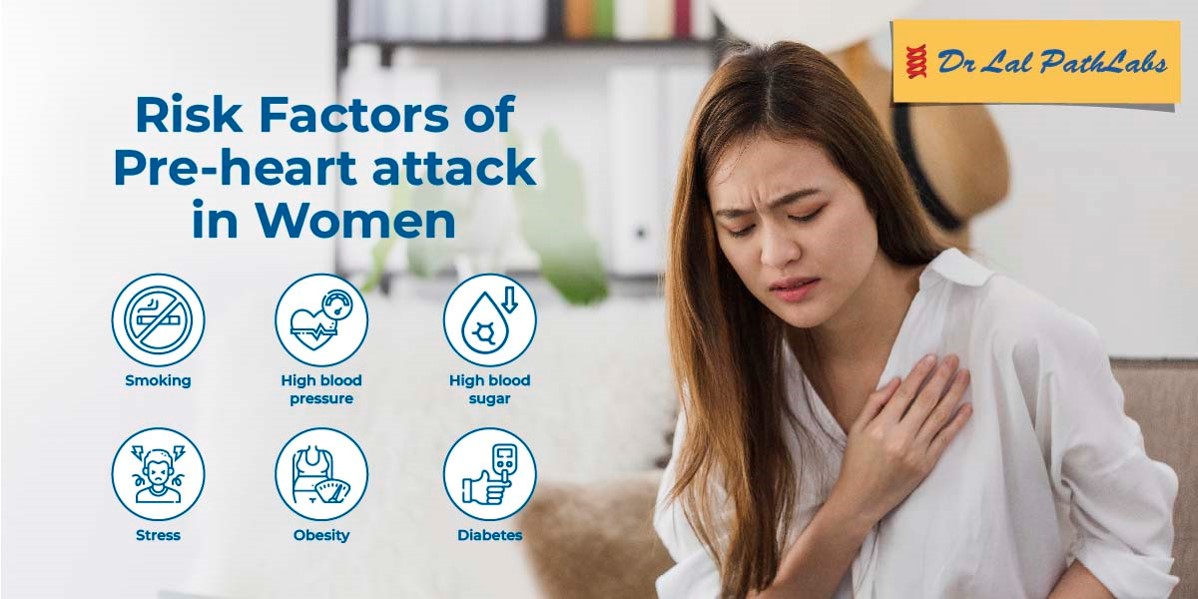Pre-Heart Attack Symptoms in Women
While it is widely assumed that men are more prone to heart attacks, there is little to no focus on the fact that women are also affected. Research suggests that 18% of women in India die due to underlying heart disease. The leading cause of these deaths among women is the lack of awareness about the symptoms and risk factors that lead to a heart attack or stroke.
Symptoms of Pre-heart Attack in Women
Heart attack symptoms in females may be different than in men. Also, since many symptoms of a heart attack in women don’t include chest pain, they’re often overlooked.
Some common warning signs of a heart attack in women include:
-
Pain in other areas
Women may experience pain or discomfort in the neck, jaw, shoulder, back, or arms. It can be mild or severe.
-
Shortness of breath
Feeling breathless or having difficulty breathing, even without exertion, can be a sign of an impending heart attack.
-
Fatigue
Another pre-stoke symptom in females can be unexplained and persistent fatigue or weakness. It may be more pronounced during physical activity.
-
Nausea or indigestion
Women may experience an upset stomach, nausea, or indigestion-like symptoms, which could be mistaken for other conditions.
-
Chest discomfort
This may feel like pressure, tightness, or a squeezing sensation in the chest, lasting for a few minutes or intermittently.
-
Lightheadedness or dizziness
Feeling dizzy or lightheaded, especially when accompanied by other symptoms, should not be ignored.
-
Cold sweats
Pre-heart attack symptoms in females include sudden cold sweats, clamminess, or unusually cold.
-
Unexplained anxiety
Feeling anxious or having a sense of impending doom without an apparent reason can be a warning sign of a heart attack in women.
-
Sleep disturbances
Unusual sleep disturbances, such as trouble falling asleep or waking up frequently, might be related to heart health issues.
-
Fluttering or rapid heartbeat
In some women, palpitations or a racing heart can be symptoms of a pre-heart attack.
Important note: Also, it’s important to remember that not all women experience the same symptoms, and some may not have any warning signs. If you or someone you know experiences any of these symptoms, especially in combination, seek immediate medical attention to rule out any heart-related issues.
Risk factors causing a pre-heart attack in women
Certain risk factors increase the chances of a heart attack among women. These heart attack risk factors can be divided into two categories: those that can be managed and those that cannot.
Manageable heart attack risk factors
You can manage or control the following heart attack risk factors by making a lifestyle change or through the assistance of your healthcare provider.
-
High blood pressure
High blood pressure (hypertension) puts extra strain on the heart and arteries, increasing the likelihood of a heart attack or a stroke. Lifestyle changes, like adopting a heart-healthy diet and being physically active, along with medication, can help manage blood pressure.
-
High cholesterol
A high level of LDL cholesterol (also known as “bad” cholesterol) can contribute to plaque formation in the arteries. Therefore, a healthy diet and regular exercise are important to control cholesterol levels.
-
Physical inactivity
Leading a sedentary lifestyle and not getting enough exercise can raise the risk of heart attacks. Regular physical activity, such as jogging or brisk walking, can help improve heart health. It can also help in controlling diabetes, obesity and cholesterol.
-
Unhealthy Diet
A diet high in saturated fats, trans fats, processed foods, and sugary beverages can contribute to heart disease. Opting for a balanced diet rich in fruits, whole grains, vegetables, and lean proteins can lower the risk.
-
Smoking
Smoking or vaping is a significant risk factor for heart attacks. Nicotine, one of the chemicals present in tobacco, can damage blood vessels and make them more prone to plaque buildup, leading to heart problems. Even if you don’t smoke, exposure to other people’s smoke can still increase your risk of heart disease.
-
Alcohol consumption
The consumption of too much alcohol can result in high blood pressure and heart problems. Therefore, it’s recommended to limit your alcohol consumption to a moderate amount.
-
Obesity and excess weight
People with extra body fat, especially around the waist, are more likely to develop a stroke or heart disease, even if they have no other risk factors. That’s why maintaining a healthy weight through diet and exercise is essential for heart health.
Non-manageable heart attack risk factors
You can manage or control the following heart attack risk factors.
-
Age
The risk of heart disease, including heart attacks, increases with age, especially after menopause.
-
Family history
Having a family history of heart disease can elevate the risk, as genetics play a role in heart health.
-
Previous heart attack or stroke
If a woman has experienced a heart attack or stroke before, her risk of having another one increases.
Besides that, women who have PCOS are said to be twice as likely at risk of suffering a heart attack or stroke.
Conclusion
Understanding the risk factors that can result in a heart attack is important to maintain optimal health. Also, being aware of the warning signs of a heart attack in women can help prevent any unfortunate incidents from occurring. Moreover, early recognition of these symptoms can lead to timely treatment, improving the chances of a successful recovery














